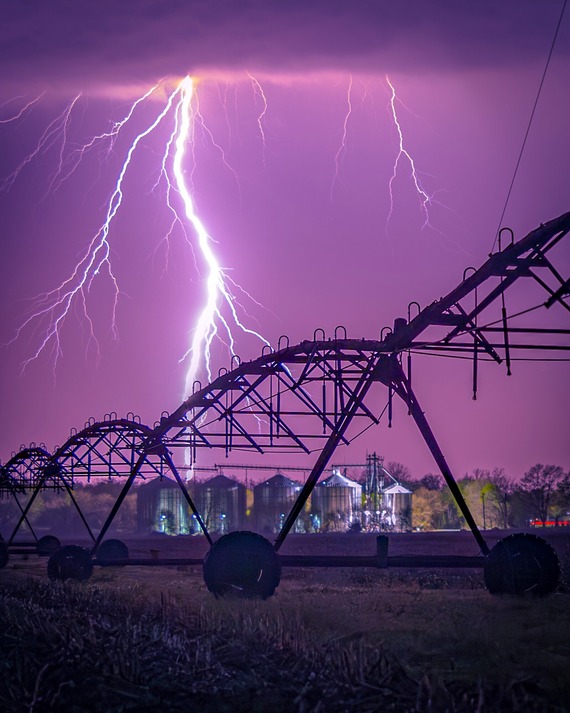
Many people are looking forward to fun festivals this summer. As usual, scammers are taking advantage of the building excitement. This time, they are cashing in with phony tickets—and even fake events.
How the scam works
You see a fantastic deal on tickets to a summer festival in your area, usually through a link on social media. The event promises live music, all-you-can-eat meals, craft beer or wine, or other fun activities.
When you click the social media link, it takes you to a professional website with fantastic pictures. You enter your credit card information to buy tickets and think you are all set. But before you buy, do a little research. Whether the event is non-existent, merely disappointing, or you just bought phony tickets, the result is the same: someone pockets your hard-earned money!
BBB Scam Tracker has received numerous reports from people who purchased fake tickets to actual events or events that have yet to materialize.
A customer in Memphis reported buying tickets for $220 for a concert: "I saw an offer for presale tickets for the group Khruangbin for a concert. I clicked on the links and it lead me to what looked like a legit site until I realized that they are a resellers site and had marked up the ticket prices tremendously. The prices were also in USD and the service charge was astounding. I contacted the company right away but they just dismiss and ignore. They are SCAMMERS and need to be off the market. They have scammed lots of people and it is very humiliating and stressful."
One consumer who purchased tickets to a fake beer crawl reported: “Reviews across multiple platforms make it clear that these events are at best extremely misleading or at worst canceled. No refunds are given, even when their inconsistent and mostly-unreachable customer service email address responds to confirm a refund will be provided.”
How to spot a fake festival
Research before you buy. Search online for the festival's name and ensure the name advertised matches the website. Scammers often use names that sound similar to those of real festivals.
Check for (working) contact information. The festival website should have a real phone number and email address.
Watch out for prices that sound too good to be true. There is no way a festival can offer tickets at extremely low prices without losing money. If the prices are much lower than elsewhere, it's likely a scam.
What can you do?
Pay with a credit card. You can dispute the charges if the business doesn't come through. Be wary of online sellers that don’t accept credit cards.
Look for secure sites. The website should begin with HTTPS (the extra “s” is for security) and have a lock symbol on the address bar.
Avoid tickets sold on Craigslist, Facebook Marketplace, and other free online listings. Scammers are skilled at providing realistic tickets and fake receipts. Check out third-party ticket sites at BBB.org before making purchases.
For general information on how to avoid scams, visit BBB.org/AvoidScams.
If you’ve spotted an event scam, report it to BBB ScamTracker at www.bbb.org/scamtracker

INDIANAPOLIS (Aug. 9, 2024) — Yesterday, Lt. Gov. Suzanne Crouch and the Indiana State Department of Agriculture announced the winners of the 2024 Indiana Agriculture Photo Contest. The winning photographs will be displayed in the lieutenant governor’s Family of Business offices in Indianapolis throughout the next year.
“Indiana has so many gifted photographers that truly know how to showcase Indiana agriculture through their talents,” said Lt. Gov. Crouch, Indiana’s Secretary of Agriculture and Rural Development. “This year's winning photos perfectly captured the Hoosier spirit and farming tradition to the highest degree.”
The winning photos were chosen from hundreds of entries in the following four categories: Agritourism, Conservation, Faces of Agriculture and On the Farm. Two winners were selected from each category, along with two winners overall.
To be considered, the photo had to be taken in the state by an Indiana resident. The photos were evaluated by a panel of independent judges based on creativity, composition and category representation.
“This year we received nearly 400 photo submissions in the Indiana Agriculture Photo Contest,” said Don Lamb, Indiana State Department of Agriculture Director. “Each of the submissions received captured the essence of Indiana agriculture and we look forward to sharing the images with you throughout the year."
The following list includes the photo contest winners for 2024:
Agritourism Category
- "Rising Above" by Bethany Hudspeth from McCordsville
- "Sunset Fair Fun" by Andrew Forrester from Madison
Conservation Category
- "Mallard Missile" by Sara Day from Muncie
- "The Proud Mother" by Richard Bennett from Indianapolis
Faces of Agriculture Category
- "An Evening Walk" by Linsie Middlesworth from Marion
- "Mini….Faces of Ag" by Jadin Wolf from Marengo
On the Farm Category
- "Buddy Seat Rider" by Marie Kohlhagen from Rensselaer
- "Focusing on Warmer Weather" by Zakery Helms-Judkins from Pendleton
Overall Category
- "Electric Pivot" by Tom Jones from Star City
- "Like Father, Like Daughter" by Jadin Wolf from Marengo
To view the winning photos, click here or visit isda.in.gov. To view photos of the photographers from the award presentation, click here.

Some scams just don’t quit! Despite running for years, this con still successfully uses threatening calls and intimidating emails to scare people into paying up. Jury duty scams have staying power because they prey on a fear of law enforcement.
How the scam works:
You answer the phone, and it’s someone claiming to be from your local law enforcement or judicial agency. The caller, who may identify themselves as the local sheriff, tells you that you’ve missed a jury duty summons and could be arrested. They may even claim that a warrant for your arrest has already been issued. The caller may appear to be very legitimate, with caller ID showing a local police phone number and an official-sounding voice on the phone. The caller may even be able to verify your name, address, and date of birth.
The scammer tells you that, fortunately, you can avoid arrest by paying a hefty fine of thousands of dollars. To pay the fine, the scammer asks you to wire money, put cash on a gift card or prepaid debit card and share the PIN, use a digital wallet app or even send cryptocurrency. Of course, the fine and the jury duty summons were never real.
Like most long-running scams, jury duty cons have a few versions, not all of which ask you for money outright. In some cases, the jury duty scam may be used to trick you into providing sensitive, personal information that can be used for identity theft. In another version, scammers use email and allegedly attach your “jury summons” to the message. The file is really malware, and downloading it will infect your computer.
BBB Scam Tracker continues to receive reports of jury duty scams. One person recently reported their experience: "Someone called me pretending to be my county's sheriff saying that I missed a court date for Jury Duty and to avoid a length and costly legal procedure and arrest, I would have to pay $3000. They texted me a fake warrant for my arrest. They knew my full name, my address, my phone number and my date of birth. So they told me to go to Walmart and send a Walmart barcode they texted me...Unfortunately they took $1000 from me, fortunately I wised up to what they were doing...I filed a police report and contacted my bank."
How to avoid jury duty scams:
Be skeptical of urgent, unsolicited emails and calls. Courts do not typically summon people via email, text message, or phone. Unless you are involved in a case and have opted into receiving other types of communications, courts normally communicate through postal mail. If you receive a questionable email with an attachment, do not click on it or download anything.
Do your research. If you ever question whether you need to appear in court, call the appropriate judicial agency and ask. If you receive an email, don’t call the number in the email, as that will likely lead you to the scammer who sent the email. If you receive a call, remember that scammers may be able to spoof a legitimate agency's phone number. To be safe, look for official websites in your jurisdiction and find their phone number on their website to call. Always be on the lookout for fake websites, too.
Ignore threatening calls that require pressure you to act immediately. Scammers try to get you to act before you think by creating a sense of urgency and fear. Don't fall for it.
Beware of requests to pay via wire transfer, prepaid debit or gift cards, digital wallet apps, or cryptocurrency. These payment methods are almost always a sign of fraud because you won't be able to get your money back.
Ask someone for help. BBB’s research shows that asking someone else is an important factor in reducing the chance of being scammed. Ask a family member or friend, “Does this sound right?”
For More Information
Learn more about phishing scams at BBB.org/PhishingScam.
If you’ve experienced a jury duty scam, help others avoid the same scam by filing a scam report at BBB.org/ScamTracker.

Everyone is invited to attend a free viewing of Disney and Pixar's film "Elemental" on Friday, August 16, at 8 p.m. at Field 4 of the Salem Community Park. The park is located at 1104 E. Hackberry St., Salem.
The event will include free admission, free popcorn, a bounce
house, concessions provided by Salem Parks and Recreation, and much more.
The film is set in Element City, where residents who are elements of nature, Fire, Water, Land and Air, live together.
This Substance Free Alternative Event is sponsored by the Washington County Family YMCA and Salem Parks and Recreation Department.

Be careful when activating your account if you’ve signed up for a streaming service, such as Netflix, Disney+, PBS Passport, or Hulu. Unfortunately, scammers are trying to steal login information and other personal data with fake websites that appear to come from the streaming service provider.
How the scam works
You purchased a subscription to a streaming service. To activate it, you need to log in on your web browser. A quick search reveals several links with the streaming service’s official name. You click on the first result.
However, the website doesn’t look quite right. For example, when you click the link, the site prompts you to update your web browser. Scammers have set up a lookalike website to trick you into downloading malware. If you click “Update” or any other button, you could download a virus that gives scammers access to your personal information. It’s best to close the page immediately.
Other times, when you click on the search result, you’re directed to a website that features your streaming service's official logo and branding. However, it looks a little (or sometimes a lot) different than what you remember. If you enter your user ID and password on a lookalike site, it goes to scammers' hands. These con artists then have the information they need to access your real account on the official website, and anywhere else you use that username and password.
How to avoid streaming service scams:
Always double-check that you are visiting an official website. Scammers can make fake websites look legitimate in search engine results, but they can’t copy a website’s official URL. Before you click on a website, look closely at the URL. Check that it is spelled correctly. Scammers hope you’ll overlook this and click without a second thought.
Be wary of ads and sponsored links. Sometimes scammers use ads to get their lookalike website to appear first in the search results. Remember, just because a website is at the top of the list doesn’t mean it’s the official website.
Be careful with your login information. Ensure you are on an official website before entering your username and password. Never enter this information into third-party websites. Keep in mind that legitimate customer service representatives generally do not ask for passwords over the phone or through email.
If you’ve been the victim of a scam, report it on BBB Scam Tracker at www.bbb.org/scamtracker. Your report can help expose scammers’ tactics and protect others from falling prey to the same con.
SalemLeader.com
Leader Publishing Company of Salem, Inc.
P.O. Box 506
117-119 East Walnut Street
Salem, Indiana. 47167
Phone: 812-883-3281 | Fax: 812-883-4446
Business Hours:
Mondays through Fridays, 9:00am - 5:00pm
News:
news@salemleader.com
Office:
office@salemleader.com
Publisher:
publisher@salemleader.com
Business
- More Business News
- Go To Guide
- Business Directory
- Auctions
Education
- More Education News
Opinion
- Editorials
- Letters to the Editor
- Columns
- Unsung Heroes
- Days Gone By
- In the Garden
- Guest Columns
- Reader's Poll
- Salem Leader Forum
- Questions and Answers
Church
- Bible Aerobics
- Church News
- Church Directory

